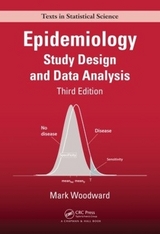
Epidemiology
Chapman & Hall/CRC (Verlag)
978-1-58488-415-6 (ISBN)
- Titel erscheint in neuer Auflage
- Artikel merken
Building an up-to-date understanding of the methodologies that can be used to shape public health policies, Epidemiology: Study Design and Data Analysis, Second Edition encompasses the study of epidemiology from the observation of associations between risk factors and disease to the use of practical, data-supported analyses. It presents study designs commonly used for a wide range of purposes, and covers the spectrum of statistical principles and analytical tools used in epidemiological research, such as techniques used in report writing, descriptive analyses, statistical models and synthesis of evidence.
New Material in This Edition Includes:
Systematic evaluation
Meta-analysis
Regression dilution
Case-cohort studies
Case-crossover studies
Pooled logistic regression
Companion Web site containing data sets for examples and exercises, SAS and Stata code for examples, a sample size calculator, and a SAS floating absolute risk macro
The second edition of a popular textbook, this book emphasizes quantitative and design aspects of epidemiological research. The author favors the use of basic mathematics and practical methods over complicated mathematical proofs, making this an ideal textbook that is comprehensive yet accessible to graduate students in epidemiology, statistics, public health studies, and/or medical research.
PREFACE
FUNDAMENTAL ISSUES
What is Epidemiology?
Case Studies: The Work of Doll and Hill
Populations and Samples
Measuring Disease
Measuring the Risk Factor
Causality
Studies Using Routine Data
Study Design
Data Analysis
Exercises
BASIC ANALYTICAL PROCEDURES
Introduction
Case Study
Types of Variables
Tables and Charts
Inferential Techniques for Categorical Variables
Descriptive Techniques for Quantitative Variables
Inferences about Means
Inferential Techniques for Non-Normal Data
Measuring Agreement
Assessing Diagnostic Tests
Exercises
ASSESSING RISK FACTORS
Risk and Relative Risk
Odds and Odds Ratio
Relative Risk or Odds Ratio?
Prevalence Studies
Testing Association
Risk Factors Measured at Several Levels
Attributable Risk
Rate and Relative Rate
Measures of Difference
Exercises
CONFOUNDING AND INTERACTION
Introduction
The Concept of Confounding
Identification of Confounders
Assessing Confounding
Standardization
Mantel-Haenszel Methods
The Concept of Interaction
Testing for Interaction
Dealing with Interaction
Exercises
COHORT STUDIES
Design Considerations
Analytical Considerations
Cohort Life Tables
Kaplan-Meier Estimation
Comparison of Two Sets of Survival Probabilities
The Person-Years Method
Period-Cohort Analysis
Exercises
CASE-CONTROL STUDIES
Basic Design Concepts
Basic Methods of Analysis
Selection of Cases
Selection of Controls
Matching
The Analysis of Matched Studies
Nested Case-Control Studies
Case-Cohort Studies
Case-Crossover Studies
Exercises
INTERVENTION STUDIES
Introduction
Ethical Considerations
Avoidance of Bias
Parallel Group Studies
Cross-Over Studies
Sequential Studies
Allocation to Treatment Group
Exercises
SAMPLE SIZE DETERMINATION
Introduction
Power
Testing a Mean Value
Testing a Difference Between Means
Testing a Proportion
Testing a Relative Risk
Case-Control Studies
Complex Sampling Designs
Concluding Remarks
Exercises
MODELLING QUANTITATIVE OUTCOME VARIABLES
Statistical Models
One Categorical Explanatory Variable
One Quantitative Explanatory Variable
Two Categorical Explanatory Variables
Model Building
General Linear Models
Several Explanatory Variables
Model Checking
Confounding
Longitudinal Data
Non-Normal Alternatives
Exercises
MODELLING BINARY OUTCOME DATA
Introduction
Problems with Standard Regression Models
Logistic Regression
Interpretation of Logistic Regression Coefficients
Generic Data
Multiple Logistic Regression Models
Tests of Hypotheses
Confounding
Interaction
Model Checking
Regression Dilution
Case-Control Studies
Outcomes with Several Ordered Levels
Longitudinal Data
Complex Sampling Designs
Exercises
MODELLING FOLLOW-UP DATA
Introduction
Basic Functions of Survival Time
Estimating the Hazard Function
Probability Models
Proportional Hazards Regression Models
The Cox Proportional Hazards Model
The Weibull Proportional Hazards Model
Model Checking
Poisson Regression
Pooled Logistic Regression
Exercises
META-ANALYSIS
Reviewing Evidence
Systematic Review
A General Approach to Pooling
Investigating Heterogeneity
Pooling Tabular Data
Individual Participant Data
Dealing with Aspects of Study Quality
Publication Bias
Is Meta-Analysis a Valid Tool in Epidemiology?
Exercises
APPENDIX A: MATERIALS AVAILABLE FROM THE WEBSITE
APPENDIX B: STATISTICAL TABLES
APPENDIX C: EXAMPLE DATA SETS
SOLUTIONS TO EXERCISES
REFERENCES
INDEX
| Erscheint lt. Verlag | 29.11.2004 |
|---|---|
| Reihe/Serie | Chapman & Hall/CRC Texts in Statistical Science |
| Zusatzinfo | 219 Tables, black and white; 125 Illustrations, black and white |
| Sprache | englisch |
| Maße | 156 x 234 mm |
| Gewicht | 1383 g |
| Themenwelt | Studium ► Querschnittsbereiche ► Prävention / Gesundheitsförderung |
| ISBN-10 | 1-58488-415-0 / 1584884150 |
| ISBN-13 | 978-1-58488-415-6 / 9781584884156 |
| Zustand | Neuware |
| Informationen gemäß Produktsicherheitsverordnung (GPSR) | |
| Haben Sie eine Frage zum Produkt? |
aus dem Bereich



